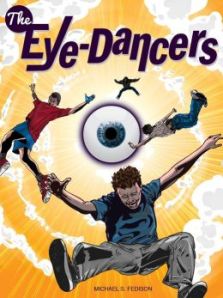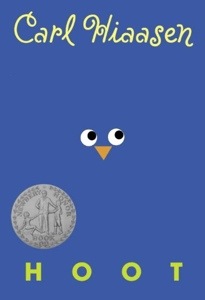This is a “cross post” from Nerd in the Brain, so if you read both blogs, don’t be alarmed. 🙂
Grace recently did a wonderful job in helping me develop questions for an author of a self-published book…the fantastic Mike Fedison. His book, The Eye-Dancers, is a great read for just about all ages. (Okay, so the toddler crowd might not enjoy it, but just about everyone else will.) 😉 Some really good advice is given to young authors in the interview, so Grace and I thought this blog would be a great venue for the interview, too. Grace hasn’t actually read The Eye-Dancers yet, but it’s next on her list…I’m thinking you’ll be hearing her thoughts on the book in the near future.
Without further ado, here’s the interview:
1. Before we really get started with the questions, tell us a little bit about your book.
The Eye-Dancers is a book that (I would like to think!) is hard to pigeonhole. On the one hand, it is a young adult sci-fi/fantasy complete with ghost girls, parallel worlds, quantum physics, mystery, and endless blue voids. I hope readers of all ages will find that the story takes them on a wild, imaginative ride. But on the other hand, the story is, at its heart, about four boys, their struggles to fit in, their difficulties with insecurities , and the challenges of adolescence. Despite the science-fiction backdrop, I very much hope that readers will become invested in the characters, root for them, and care about them.
The Eye-Dancers also explores the theme of oneness—everything is connected. Events and people that seem so far away, a universe away, are, in actuality, much closer to us than we ever dared to think.
2. How did The Eye-Dancers come to be? Was it a story you formulated over time or were you just zapped with inspiration one day?
Both! Back when I was a teenager, I had a vivid dream—the kind of dream that stays with you long after you wake up. In the dream, I felt an unexplainable need to look through my bedroom window, into the street. It was late, well after midnight. When I looked outside, there was a girl standing beneath the streetlight. But she was no ordinary girl. The light seemed to filter right through her, as though she were more ghost than girl. She gestured for me to come outside, and I felt scared, as if she represented a threat.
Then I woke up. Even back then I was always looking to write stories, and I remember wanting very much to incorporate this “ghost girl” into a tale. I tried several, but nothing worked. I couldn’t seem to build a story around her. So—reluctantly, I filed her away in a “story vault,” hoping that, one day, she would appear in a novel or shorter piece of fiction.
Year went by—twenty years, to be exact! And then, one night, I had the same dream—dreaming of this same “ghost girl.” But this time, when I woke up, the basic idea for The Eye-Dancers was in place. It was one of those extreme highs in a writer’s life. Going to bed, I had nothing. Upon waking, I had a novel to write. I felt energized, and couldn’t wait to get started. The next day, I did . . .
3. Tell us a bit about your writing process. Are there outlines and notes and scheduled writing times or a flurry of ideas crammed into a document when you have spare moments or something in between?
I don’t really have scheduled writing times—my dream is to be able to be a full-time novelist, but that hasn’t happened yet! As such, I just write when I can. Sometimes it’s very early in the morning. Sometimes it’s on a lazy, nondescript Saturday afternoon. Other times it’s late at night. The key is—to write at least something nearly every day. Once I get into the process of writing a novel, I want to make sure I keep the momentum going.
I don’t use detailed, chapter-by-chapter outlines—I find those too restrictive. The creative process is fluid and can change midstream. I wouldn’t want to adhere firmly to a set plan ahead of time when the characters in the story might be telling me to go in an entirely new direction. (And yes, characters DO talk to me, after a fashion! I need to keep my ears open.) I do write a lot of notes, though—guideposts where I think the story is going. These, too, can change, though, the deeper I get in to the novel.
4. What advice do you have for a young aspiring author?
Write what you love, not what’s in vogue. Write because you have to, because if you don’t, you feel like you’re going to burst. Be willing to work hard at your craft, and edit, edit, edit. When you think a story is finished, it isn’t. Be open and receptive to feedback, but at the same time, believe in your story, your voice, and what you’re trying to say. And keep dreaming, keep persevering, never stop trying. There will be rejections and criticisms and self-doubts. Get through those. Keep going, and reach for the stars.
5. Your characters are incredibly intriguing and flawed (in an interesting way). Are the characters of The Eye-Dancers based on aspects of yourself or people you know?
They are! The four main characters are inspired by friends I knew growing up. And yes, there are aspects of myself in them, as well, particularly the character of Mitchell Brant. It was very fun writing for these boys!
6. Is there a character in the book that you relate to better than the others?
Without a doubt, Mitchell Brant. Mitchell’s love of old comic books in general (and The Fantastic Four in particular), his shyness around girls, and his overactive imagination are aspects I, myself, shared when I was that age.
7. What were your favorite books as a kid? Were you influenced by them as you were writing your novel?
Well, certainly those old comic books. I still love collectible comic books from decades past! Also, I was (and still am) a big fan of The Twilight Zone. I always enjoyed the imaginative storytelling of that show and the important themes it explores. As for books, Ray Bradbury has always been a favorite—I love his writing style, his enthusiasm, his imagination. I used to read Stephen King a lot. It was a favorite of mine when I was a teenager. I think all writers are influenced by their favorite authors. As time goes on, though, you naturally develop your own style, perspective, and cultivate a voice and point of view that is uniquely your own.
8. What are you reading now?
Honestly, most of my reading is assigned! I do a lot of freelance proofreading work for a handful of book publishers. On average, I proofread thirty to forty books each year—which, unfortunately, doesn’t leave as much time as I’d like for pleasure reading. That said, when there is a book I really want to read, I will read it! I enjoy reading the work of indie and up-and-coming authors. I love the classics, and enjoy imaginative storytelling in all its many forms. In a nutshell, I love to read. Always have, always will.
9. Why did you decide to self publish? Are you pleased with the results?
I did query several agents, and a handful of publishers first, but, despite some interest, nothing ever worked out the way I would have liked. In the end, I decided to self-publish. I liked the idea of marketing the book myself, interacting directly with readers, setting the book’s selling price—just being in complete creative control of the entire process.
As for the results, that’s hard to say. I look at this as a long-term project, and I feel like the process has only just begun. I have had a great time interacting with readers and bloggers. That has been a joy. I suppose I will wait to claim success (or failure) for at least a couple of years. Until then, I will do my best to “get the word out” regarding The Eye-Dancers. A wonderful interview opportunity like this one certainly helps!
10. Do you have any other projects in the works for us to look forward to?
I am putting the finishing touches on a collection of three short stories that will be released later this summer. Also, I have just begun working on a sequel to The Eye-Dancers. It will be fun to delve back into that world again!
We hope you enjoyed our first author interview! We had a lot of fun with this…perhaps more author interviews should be in our future?





